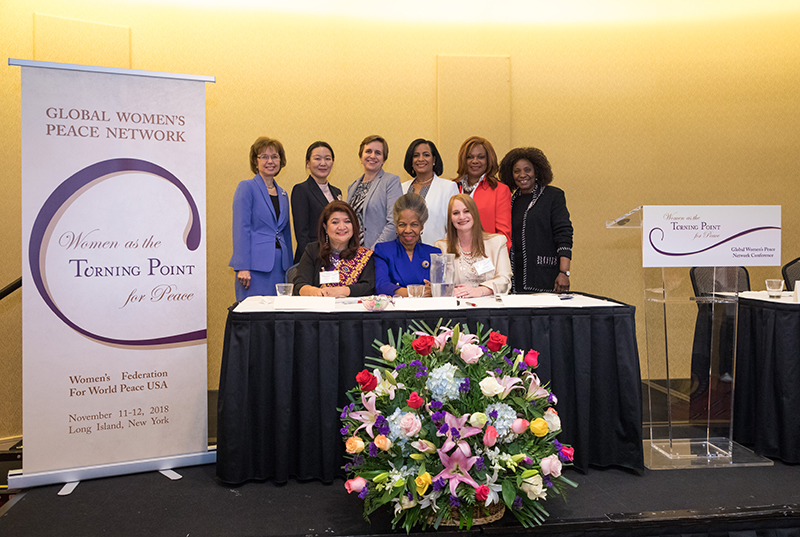Women as the Turning Point for Peace
Women’s Federation for World Peace (WFWP) USA launched the Global Women’s Peace Network (GWPN) in Long Island, New York on Sunday, November 11 with over 70 people in attendance. Women from diverse professional and life backgrounds came to learn and share with each other about how women are the key to turning the world towards peace.
The program kicked off with an introductory video of WFWP International and all its countless efforts in creating one world living in harmony as one family. The gathering then took a moment to acknowledge, remember and honor our beloved veterans, giving thanks to them for enabling us to live in peace and reflecting on the work still needed to create peace.
Professor Yeon Ah Moon, President of WFWP International, graciously welcomed all guests. Everyone came together to build a peace culture – that of living for the sake of others and bringing out feminine leadership qualities. It is love and responsibility that will bring us closer to a harmonious world. She reminded everyone that the blessings America received is not only for America, but it is to be a nation that can help others – bring unity and harmony and peace.
After the welcoming remarks, Angelika Selle, President of WFWP USA, introduced the GWPN, saying that the turning point is really the change and development over the years and now is the time for gathering all that was sown and to go up and beyond in promoting and creating lasting peace. President Selle explained that WFWP is not a feminist organization but rather feminine – in that the feminine qualities of women reflect that of a mother who melts away hate and can give birth to a new way of life.
President Selle outlined GWPN’s three areas of involvement: Women’s leadership, Family (where family members learn values and respect), and Environment (physical and spiritual). “Peace is relational. Together we can make a difference!”
Following President Selle came a beautiful performance by Makiko Taguchi, an accomplished violinist, which primed the guests for an exhilarating panel discussion and question and answer session. Five professional women shared how women are the turning point for peace. Each person portrayed competency, dignity and professional success, but each also showed such deep passion and positivity, along with a strong spiritual inclination towards and love for God and creating peace. Most of all, each strongly pointed to action. It is time to stop talking about peace and start building it.
The first panelist, Audra Hajj, CEO of Phoenix Business Cycle, revealed an incredibly tumultuous childhood in the foster care system, but she had made the decision to move forward in life and spread kindness one person at a time, and to help others live a strength-based life.
The second, Ester Davis, television show hostess, writer and media specialist, talked about communication and media, and how that creates family values. She implored the audience that women as a turning point can use the media and government processes to promote the values and peace in our families, communities, media and culture.
The third, Astrid Fidelia, CEO and Founder of Stand Up To Poverty Inc. spoke about how there simply cannot be peace where there is poverty. Therefore, peace must be the baseline mission of all organizations. Peace work is challenging, but it can be done. When we can love people in all areas of life, we give them permission to do the same. We need to focus on all the blessings we do have and use them to move forward.
The fourth, Grace Valera, former diplomat who worked in the Philippine embassies in Spain and Washington, D.C., spoke on her experiences promoting cross-cultural understanding. She started with a famous quote from Eleanor Roosevelt: “A woman is like a teabag – you can’t tell how strong she is until you put her in hot water.” She shared about her experience as a diplomat and how her life’s focus has always been to find a peaceful solution. She particularly shared her passion for the arts and culture, and how she advocated for and promoted peace through the cultural arts.
The final panelist, Dr. Elaine Duval, an author and founder of the Daughters of Zion Restorational Ministry, discussed the role of women in building peace and building a nation. She strongly stated that the source of the vision for a nation is only God, and we must go back to that source for our direction.
After a delicious lunch, a recitation of a self-authored poem about Buddha and the singing of gospel songs by Joan Myers, participants brainstormed projects that would be proposed to the GWPN committee. Project proposals ranged from helping women learn how to legislate and lobby for what they really want in their communities and state, to promoting families to eat dinner together by creating “Peace Cards” as conversation starters at dinner time.
Finally, a stirring call to action was given by Fannie Smith, WFWP Schools of Africa Coordinator, urging the audience that the GWPN is no girly club. Instead, it is a network of women of real action and substance who are here to support and promote each other to do even more great works. Everyone declared: “I am the turning point for peace!”
Reflections
“I was moved by being in a room full of powerful women who are selfless and making the world a better place. The leadership and kindness I saw really made me feel at home. They have a like-minded vision and it’s fueled by love. I was so empowered and inspired.” – Astrid Fidelia
“I was inspired by the power of the sisterhood of peace and love, by the sense of unity of spirit and of purpose as peace-makers. I am leaving this conference feeling convinced that I, myself, am a “mother of peace.” I will now go forth and produce, give birth to peace, for the healing of our families and nation.” – Dr. Elaine Duval
“What I gained from the conference is that this is no longer a dress rehearsal. We are doing it. We’re into it and we can’t go back, there’s no way to go back, we can only go ahead, and by being with this group of women I can see so many people in so many areas that are primed and ready to go. I’m amazed by the people that have gathered here.” – Cynthia Myers
“What I learned is being thankful of the little things and that we are all privileged, as one of the speakers mentioned. We can make a change and bring about the difference. Just being thankful of all you have and to look at things in a positive way and make it better. Look at the brighter future.” – Behnoosh Sethna
“I really liked the discussion tables toward the end. I felt like being able to get feedback from other members of the group could really help us think bigger and think beyond our personal ideas. I think when we were able to bounce things off of each other, there’s just better results than what we can come up with on an individual level. We know that change ultimately starts with us, but it takes a collective effort to create mass change. I really loved the discussion tables, it was inspiring for me to meet with people of different backgrounds and different skill sets.” – Ariella Toren
“My main takeaway was that I felt empowered. I think when we come and we listen to panelists it is helpful when you feel empowered from within. And you can feel empowered from within when you feel you are of value and you can contribute. I felt in this discussion where there was that give and take energy, people felt empowered, they felt that our opinions matter, and I’m contributing to something bigger. We know that change can start on a small scale and reach out. One of the women talked about Martin Luther King Jr. being a single individual who created immense change in the world. We know that it is possible and that it does impact other people.” – Anonymous






























